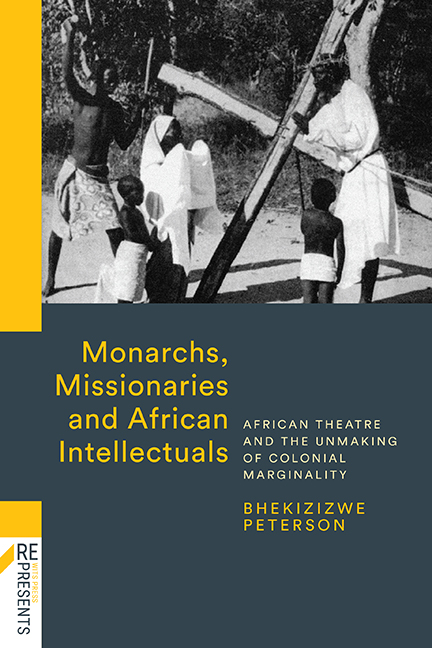 Monarchs, Missionaries and African Intellectuals
Monarchs, Missionaries and African Intellectuals Book contents
- Frontmatter
- Dedication
- Contents
- Preface and Acknowledgements
- Note on Zulu Orthography
- Introduction: Staging the (Alien)nation: African Theatre and the Colonial Experience
- 1 ‘All Work and No Play Makes Civilisation Unattractive to the Masses’: Theatre and Mission Education at Mariannhill
- 2 ‘I Will Open My Mouth in Parables’:Accounting for the Crevices in Redemption
- 3 Parallel Time, Parallel Signs, Discordant Interpretations
- 4 B.W. Vilakazi and the Poetics of the Mental War Zone
- 5 The Bantu Men’s Social Centre: Meeting the Devil on his own Ground
- 6 The Bantu Dramatic Society According to a Gossip Columnist
- 7 Contesting ‘The Bantu Imagination’: The British Drama League & The New Africans
- 8 H.I.E. Dhlomo: Measuring the Distance Between Armageddon and Revolution
- 9 ‘The Black Bulls’: Assembling the Broken Gourds
- 10 Hegemony and Identity: What a Difference ‘Play’ Makes
- Notes
- Bibliography
- Index
Introduction: Staging the (Alien)nation: African Theatre and the Colonial Experience
Published online by Cambridge University Press: 12 October 2021
- Frontmatter
- Dedication
- Contents
- Preface and Acknowledgements
- Note on Zulu Orthography
- Introduction: Staging the (Alien)nation: African Theatre and the Colonial Experience
- 1 ‘All Work and No Play Makes Civilisation Unattractive to the Masses’: Theatre and Mission Education at Mariannhill
- 2 ‘I Will Open My Mouth in Parables’:Accounting for the Crevices in Redemption
- 3 Parallel Time, Parallel Signs, Discordant Interpretations
- 4 B.W. Vilakazi and the Poetics of the Mental War Zone
- 5 The Bantu Men’s Social Centre: Meeting the Devil on his own Ground
- 6 The Bantu Dramatic Society According to a Gossip Columnist
- 7 Contesting ‘The Bantu Imagination’: The British Drama League & The New Africans
- 8 H.I.E. Dhlomo: Measuring the Distance Between Armageddon and Revolution
- 9 ‘The Black Bulls’: Assembling the Broken Gourds
- 10 Hegemony and Identity: What a Difference ‘Play’ Makes
- Notes
- Bibliography
- Index
Summary
Nothing lasts long enough to
have been. These fragments of
everything descend upon us
haphazardly. Only rarely do we
see the immanence of wholes.
And that is the beginning of art.
(Dambudzo Marechera, House of Hunger, 60)Since the late nineteenth century South Africa has conjured up the image of a dramatic spectacle in the popular imagination. The defeat of the British army in 1879 by the forces of Cetshwayo kaMpande Zulu (Cetshwayo, son of Mpande of the royal Zulu clan) at the battle of ISandlwane; the South African War of 1899–1902; the racial policies that informed successive governments, and their crystallisation in repression which involved the large scale resettlement and banishment of Africans; the varied forms of social response embraced by Africans, from the muted to the audacious; these are just a few of the social spectacles that typified South African history in the first half of the twentieth century. H.I.E. Dhlomo, after teasing out the manner in which the social order was being enacted by the state and its oppositions, likened the charged racial politics of the country to the ‘prelude to a bloody play. Dhlomo's observation, coming as it does from a premier African dramatist, gestures to the intricate ways in which societies are reliant on the ‘vocabulary of drama’ in trying to narrate and comprehend the ‘dramatisation of social action‘. Art, as Marechera points out, is the quintessential terrain where the haphazard fragments of events are given a formal coherence that invests them with ideological significance.
What drama shares with other literary and non-literary genres is the organising principle of narrative. Narrative, according to Roland Barthes, is the ‘international, transhistorical, transcultural’ human predisposition to recount historical reality in the form of a story. The act of narration involves complex processes of mediation as the events, their unfolding and significance, are transformed and reinvented under the social pressure of imbuing experience with particular meanings. Narrative, Jameson has argued, is a socially symbolic act whose textualisation or narrativisation of history does not obliterate the ideas or facts of history, neither does it reduce history to the endless slippage of being a text among other texts as some post-modernist accounts would have it.
- Type
- Chapter
- Information
- Monarchs, Missionaries and African IntellectualsAfrican Theatre and the Unmaking of Colonial Marginality, pp. 1 - 22Publisher: Wits University PressPrint publication year: 2021


